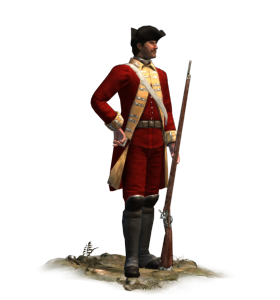Line Infantry (ETW Unit)
![]() These musket-armed troops use massed volleys to break an enemy, relying on discipline to withstand any counter fire.
These musket-armed troops use massed volleys to break an enemy, relying on discipline to withstand any counter fire.
Overview
“Marching regiments” or “line battalions” make up the majority of units in European-style armies. They are so called because they form the line of battle, not because they always deploy in lines. Indeed, over time the capabilities of line infantry should improve as new tactics, drill and weaponry are developed.
These soldiers carry muzzle-loading, smooth-bore muskets firing lead balls as wide as a man’s thumb. These are inaccurate weapons, effective only over 200 paces or so and when fired in massed volleys. The ability to fire and reload with machine-like regularity with shot and bullet flying and comrades falling all around is what wins battles.
Historically, in many armies colonels received a fee to raise regiments, which remained their personal property and commands. They jealously guarded their rights to appoint friends, relatives and hangers-on as regimental officers. This contractor system, however, allowed unscrupulous officers to make handsome profits by pocketing the pay of non-existent soldiers. The better colonels did take a pride in their regiments, spending their own fortunes on good uniforms and weapons. The capabilities of a “standard” line infantry unit therefore varied between nations and over time. It wasn’t until the 1760s that anything approaching uniformity of drill, equipment and regulations became the norm.
Line infantry regiments remained unchanged throughout the period, and their organizational pattern still forms the basis of modern military units.
Details
Line infantry form the heart of any army in Empire: Total War. In a head-on fight, a line infantry will be able to beat almost any non-line infantry regiment (with the exception of a well-angled and timed salvo of canister shot fired from an artillery piece). Line infantry hold the advantages of superior numbers (and therefore superior firepower when Fire by Rank is researched), morale and defensive capabilities.
Line infantry have several technology upgrades available to them. Plug Bayonets increase their melee capabilities, but require the infantry to equip them manually and force them to remain in melee mode until after the battle; Ring Bayonets are permanently and automatically attached, and still allow the infantry to fire, but reduce their firing rate; Socket Bayonets neither sacrifice shooting abilities nor speed while providing the line infantry with good melee capabilities. Bayonet technologies aside, line infantry benefit enormously from the Fire By Rank, which enables all ranks of the infantry to fire one by one as opposed to just the first rank. Fire and Advance gives line infantry the ability to close in on enemies while simultaneously delivering fire to against them. Finally, Square Formation allows line infantry to form a square, reducing their firepower and mobility but giving them a powerful defensive bonus against cavalry.
Every nation in the game has slightly different line infantry. The British, for example, have some of the finest line infantry in the game, while Prussia's line infantry are almost as good and very inexpensive to field. On the other hand of the spectrum, Russia and Austria have notoriously poor line infantry in terms of discipline. The Ottoman equivalents of line infantry are the Isarelys and the Nizam-I Cedit infantry, while the Maratha Confederacy have Bargir Infantry and Sikh Musketeers.
Line infantry are at their best when their flanks are guarded with yet more line infantry. Large numbers of regiments lined up and facing parallel to the enemy is usually the focal point of the battle, with both sides shooting at each other until one side breaks and runs. In cases like this, the center of the line is especially important: if it breaks, then morale is reduced for the units surrounding it. Therefore, the center should be comprised of the better line infantry regiments. On the other hand, the enemy center should be considered the primary target for artillery, grenades, etc.
The flanks are important, too. They are susceptible to cavalry charges. To prevent this, attach cavalry, stakes, or square formation to the sides of the line of battle.
Before Fire by Rank is researched, only the first rank of line infantry fire their muskets. Stretching out their lines as thin as can be sensibly done so will maximize their firing volume before this technology is researched. This tactic also has the advantage of enveloping enemy positions in overlapping fields of fire. However, thinner lines are more susceptible to breaking from cavalry charges.
Factions
 Great Britain
Great Britain United Provinces
United Provinces Austria
Austria Bavaria
Bavaria Gran Colombia
Gran Colombia Courland
Courland Denmark
Denmark France
France Genoa
Genoa Georgia
Georgia Greece
Greece Hannover
Hannover Hessen
Hessen Hungary
Hungary Ireland
Ireland Knights of St. John
Knights of St. John Louisiana
Louisiana Maratha Confederacy
Maratha Confederacy Mexico
Mexico Naples & Sicily
Naples & Sicily New Spain
New Spain Norway
Norway Italian States
Italian States Savoy
Savoy Poland-Lithuania
Poland-Lithuania Portugal
Portugal Prussia
Prussia Russia
Russia Quebec
Quebec Saxony
Saxony Scotland
Scotland Spain
Spain Sweden
Sweden Thirteen Colonies
Thirteen Colonies United States
United States Venice
Venice Westphalia
Westphalia Württemberg
Württemberg
